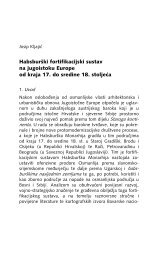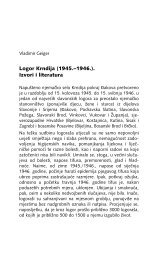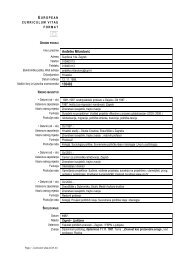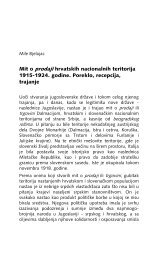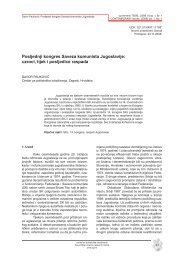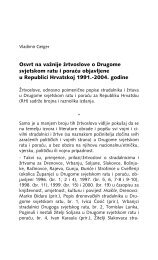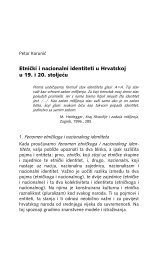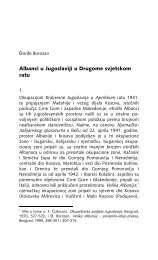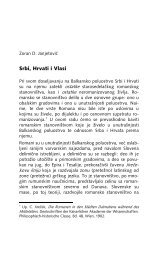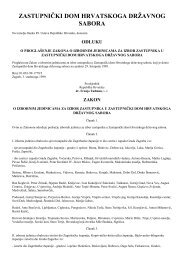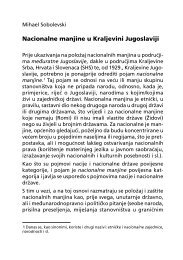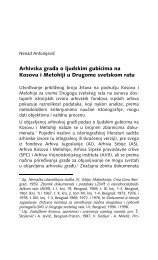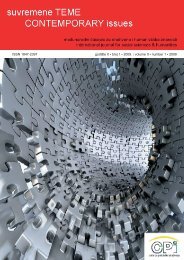- Page 3 and 4:
393124.2.6 Ervenik municipality 367
- Page 5 and 6:
393106.1.1 Joint criminal enterpris
- Page 7 and 8:
39308General abbreviationsACHRAPCBo
- Page 9 and 10:
393061. Introduction1. The Accused,
- Page 11 and 12:
393047. The three Accused are each
- Page 13 and 14:
393022. Sources and use of evidence
- Page 15 and 16:
39300her against improper questioni
- Page 17 and 18:
3929823. The Trial Chamber received
- Page 19 and 20:
39296document through a previously
- Page 21 and 22:
39294Jozo Bilobrk, Antonio Gerovac,
- Page 23 and 24:
39292same line of reasoning, the Ch
- Page 25 and 26:
39290the Karadžić case (D2019) an
- Page 27 and 28:
3928844. Article 21 (4) (g) of the
- Page 29 and 30:
39286In Chapter 5, the Trial Chambe
- Page 31 and 32:
3928454. Exhibit P689 is an inter-a
- Page 33 and 34:
39282remained mindful of events occ
- Page 35 and 36:
39280members of Croatian military f
- Page 37 and 38:
392783. The Accused3.1 Ante Gotovin
- Page 39 and 40:
39276forces. 155 Gotovina was the o
- Page 41 and 42:
39274Čermak, Gotovina’s headquar
- Page 43 and 44:
39272ordered that regular daily rep
- Page 45 and 46:
3927080. On 3 August 1995, at 9:45
- Page 47 and 48:
39268Herzegovina)-Knin and in the d
- Page 49 and 50:
39266of the difficulties for the VP
- Page 51 and 52:
39264TRS-2, and TS-3. Based on P112
- Page 53 and 54:
39262Commander of the Joint VP Comp
- Page 55 and 56:
39260for certain urgent tasks like
- Page 57 and 58:
39258and the 73rd VP Battalions wer
- Page 59 and 60:
39256headquarters of the Battalion,
- Page 61 and 62:
39254120. The Chief of the VP admin
- Page 63 and 64:
39252because the completion of thos
- Page 65 and 66:
39250zones of responsibility, 367 w
- Page 67 and 68:
39248Investigation charged with est
- Page 69 and 70:
39246the Traffic Company of the 72n
- Page 71 and 72:
39244in the area of responsibility
- Page 73 and 74:
39242circumstances, was not exclude
- Page 75 and 76:
39240Tuñman issued a written order
- Page 77 and 78:
39238beyond the abilities of Paši
- Page 79 and 80:
39236Čermak had any authority. 480
- Page 81 and 82:
39234taken up their positions. 502
- Page 83 and 84:
39232officers. 523 The Trial Chambe
- Page 85 and 86:
39230and hence he was not a garriso
- Page 87 and 88:
39228fighting terrorism and de-mini
- Page 89 and 90:
39226knew throughout the 1990s, it
- Page 91 and 92:
39224Forward Command Post with most
- Page 93 and 94:
39222operated on call from axis com
- Page 95 and 96:
39220to be in constant contact, by
- Page 97 and 98:
39218directed and coordinated the a
- Page 99 and 100:
39216187. According to documentary
- Page 101 and 102:
39214were duty-bound to forward inf
- Page 103 and 104:
39212194. With regard to Markač’
- Page 105 and 106:
392104. Crimes committed in municip
- Page 107 and 108:
39208that he was too old and wanted
- Page 109 and 110:
39206him, there were no SVK units o
- Page 111 and 112:
39204from the direction where the s
- Page 113 and 114:
39202in. On 4 September 1995, four
- Page 115 and 116:
39200Chamber will further consider
- Page 117 and 118:
39198August 1995 in his home but re
- Page 119 and 120:
39196and other relatives fled to Se
- Page 121 and 122:
39194Serb ethnicity. The Trial Cham
- Page 123 and 124:
39192voice he did not recognize wit
- Page 125 and 126:
39190Sava Babić (Further Clarifica
- Page 127 and 128:
39188this communication, Sava Babi
- Page 129 and 130:
39186Croatian Court found that Duki
- Page 131 and 132:
39184Chamber considers their eviden
- Page 133 and 134:
39182Čanak about the weapons befor
- Page 135 and 136:
39180Marčetić. 931 According to t
- Page 137 and 138:
39178out after asking to see his Cr
- Page 139 and 140:
39176258. According to a Croatian i
- Page 141 and 142:
39174Vladimir Pavletić as Mirna So
- Page 143 and 144:
39172with caps on their head. 980 O
- Page 145 and 146:
39170268. Radoslav Ognjenović, a S
- Page 147 and 148:
39168Administration of Zadar-Knin h
- Page 149 and 150:
39166the possible suspect Nedeljko
- Page 151 and 152:
39164October 1995, sometime between
- Page 153 and 154:
39162towards Gošić in Kistanje mu
- Page 155 and 156:
39160the investigation. 1079 Kardum
- Page 157 and 158:
39158forces, if any, the persons in
- Page 159 and 160:
39156late afternoon of 28 September
- Page 161 and 162:
39154doctor gave them the names of
- Page 163 and 164:
39152Zadar VP, were brought into th
- Page 165 and 166:
39150identified by classical method
- Page 167 and 168:
39148Manda Tišma (Further Clarific
- Page 169 and 170:
39146August 1995, people started fl
- Page 171 and 172:
39144Dragičević, a Serb born in 1
- Page 173 and 174:
39142came under attack by Croatian
- Page 175 and 176:
39140Guards Brigade insignia with r
- Page 177 and 178:
39138Guard Brigade on the uniforms
- Page 179 and 180:
39136both his legs were broken but
- Page 181 and 182:
39134unconscious and was bleeding h
- Page 183 and 184:
39132Alun Roberts. 1323 Later, Witn
- Page 185 and 186:
39130who was driving the tractor. A
- Page 187 and 188:
39128members of the HV 7th Guards B
- Page 189 and 190:
39126burnt. 1352 After the same sol
- Page 191 and 192:
39124house. 1374 The witness stated
- Page 193 and 194:
39122niece. 1399 On 7 August 1995,
- Page 195 and 196:
39120mother discussed the incident
- Page 197 and 198:
39118above, the Trial Chamber has c
- Page 199 and 200:
39116right thigh and two gunshot in
- Page 201 and 202:
39114incident in relation to Counts
- Page 203 and 204:
39112valley, whereas its hamlets, i
- Page 205 and 206:
39110Grubori. The witness saw two v
- Page 207 and 208:
39108clear and uninterrupted view a
- Page 209 and 210:
39106cases were found in the same r
- Page 211 and 212: 39104that their husbands had been k
- Page 213 and 214: 39102in the former Sector South bas
- Page 215 and 216: 39100report to their group leader,
- Page 217 and 218: 39098exclusively of members of the
- Page 219 and 220: 39096Gračac. 1639 He submitted it
- Page 221 and 222: 39094378. Branko Balunović, specia
- Page 223 and 224: 39092heard three single shots and t
- Page 225 and 226: 39090KN01/245B as Miloš Grubor bor
- Page 227 and 228: 39088witness stayed in Golubić wit
- Page 229 and 230: 39086There were more than 300 peopl
- Page 231 and 232: 39084exhibit D178, the HV 4th Guard
- Page 233 and 234: 39082officer and HRAT member in the
- Page 235 and 236: 39080and one interpreter observed t
- Page 237 and 238: 39078black trousers, a white long-s
- Page 239 and 240: 39076412. According to the forensic
- Page 241 and 242: 39074Donji Lapac municipality. 1845
- Page 243 and 244: 39072basement. 1872 In the yard out
- Page 245 and 246: 39070base in Burum in Knin municipa
- Page 247 and 248: 39068returned home in 1998, whereup
- Page 249 and 250: 39066as Stevan Baljak, born in 1966
- Page 251 and 252: 39064and that doctors told her that
- Page 253 and 254: 39062that the persons who detained
- Page 255 and 256: 39060made a note that the unit to w
- Page 257 and 258: 39058municipality, where she was to
- Page 259 and 260: 39056places the date of 28 August 1
- Page 261: 39054the need to evacuate. 1994 Ru
- Page 265 and 266: 39050461. Witness 136, a Serb field
- Page 267 and 268: 39048464. The Trial Chamber has rec
- Page 269 and 270: 39046there any Chetniks or weapons
- Page 271 and 272: 39044according to the 1991 Populati
- Page 273 and 274: 39042476. Based on the many similar
- Page 275 and 276: 39040Croatian soldiers came to her
- Page 277 and 278: 39038soldiers. 2103 The reporting p
- Page 279 and 280: 39036because the SVK had already fl
- Page 281 and 282: 39034in Knin which, according to th
- Page 283 and 284: 39032approaching his house from the
- Page 285 and 286: 39030after which he sprayed bullets
- Page 287 and 288: 39028civilians were executed there
- Page 289 and 290: 39026Krstan Šare born on 15 Octobe
- Page 291 and 292: 39024separate vehicles. The third a
- Page 293 and 294: 39022Lazo Damjanić (Further Clarif
- Page 295 and 296: 39020Dawes knew that these soldiers
- Page 297 and 298: 390188 August 1995, Vesela Damjani
- Page 299 and 300: 39016body of Milan Babić, born in
- Page 301 and 302: 39014day, the witness’s two sons,
- Page 303 and 304: 390124.2 Destruction of Serb proper
- Page 305 and 306: 39010military police in the Knin re
- Page 307 and 308: 39008recognized the SVK weapons car
- Page 309 and 310: 39006and out of buildings, taking s
- Page 311 and 312: 39004times during the trip. 2351 Th
- Page 313 and 314:
39002mines. 2368 Berikoff stated th
- Page 315 and 316:
39000open. 2387 On 28 August 1995,
- Page 317 and 318:
38998destroyed after Operation Stor
- Page 319 and 320:
38996Home Guard Regiment, part of O
- Page 321 and 322:
3899431 August 1995, the 6th Benkov
- Page 323 and 324:
38992once, while others were preser
- Page 325 and 326:
38990August 1995 at 10:30 p.m., the
- Page 327 and 328:
3898810 August 1995, and Drča’s
- Page 329 and 330:
38986catching fire, the Trial Chamb
- Page 331 and 332:
38984air. 2494 At first, Dangerfiel
- Page 333 and 334:
38982been completely burned down an
- Page 335 and 336:
38980588. The evidence received ind
- Page 337 and 338:
389784.2.4 Donji Lapac municipality
- Page 339 and 340:
38976Under these circumstances, the
- Page 341 and 342:
38974Lapac via a forest road with H
- Page 343 and 344:
38972Gračac municipality. 2574 The
- Page 345 and 346:
38970Special Police’s 4th auxilia
- Page 347 and 348:
38968610. Around 2 p.m. on 7 August
- Page 349 and 350:
38966which involved the military an
- Page 351 and 352:
38964the unit remained throughout t
- Page 353 and 354:
38962fire. 2682 The witness saw ano
- Page 355 and 356:
38960platoon in Donji Lapac. 2709 O
- Page 357 and 358:
38958observed a strong HV presence
- Page 359 and 360:
38956Lapac. Considering the ethnic
- Page 361 and 362:
38954which armed forces, if any, we
- Page 363 and 364:
38952night for no particular reason
- Page 365 and 366:
38950time. The Trial Chamber notes
- Page 367 and 368:
38948Based on the UNMO’s descript
- Page 369 and 370:
38946saw groups of soldiers herd fl
- Page 371 and 372:
38944number of persons involved in
- Page 373 and 374:
38942663. Based on the evidence rec
- Page 375 and 376:
38940it was impossible to leave the
- Page 377 and 378:
38938Gračac, resting and preparing
- Page 379 and 380:
38936from Croatian forces who other
- Page 381 and 382:
38934fair condition. 2861 When Herm
- Page 383 and 384:
38932Lapac, Donji Lapac, and Borič
- Page 385 and 386:
38930Collective Forces Staff moved
- Page 387 and 388:
38928UNMO reports. At 10:30 a.m. on
- Page 389 and 390:
38926686. John Hill, Commanding Off
- Page 391 and 392:
38924Based in particular on the evi
- Page 393 and 394:
38922695. Considering the ethnic co
- Page 395 and 396:
38920were set on fire or destroyed.
- Page 397 and 398:
38918Croatian military forces or Sp
- Page 399 and 400:
38916Palanka709. The Trial Chamber
- Page 401 and 402:
38914house. The evidence further in
- Page 403 and 404:
38912did nothing. VP arrived and as
- Page 405 and 406:
38910looted and that the houses the
- Page 407 and 408:
38908726. On 19 August 1995, UNMO s
- Page 409 and 410:
38906735. According to a UNCIVPOL i
- Page 411 and 412:
38904a proper factual basis. Nor ha
- Page 413 and 414:
38902entering houses in Gošić, th
- Page 415 and 416:
38900in Kistanje municipality, cons
- Page 417 and 418:
38898where he saw some SVK soldiers
- Page 419 and 420:
38896times no soldiers would come s
- Page 421 and 422:
38894were in the village that day t
- Page 423 and 424:
38892Ognjenović recognized this pe
- Page 425 and 426:
38890everything from another villag
- Page 427 and 428:
38888about to which armed forces, i
- Page 429 and 430:
38886of ðevrska, Kistanje and Drni
- Page 431 and 432:
38884Skradin, at which point he con
- Page 433 and 434:
38882792. On 8 August 1995, Colonel
- Page 435 and 436:
38880testified that he had no doubt
- Page 437 and 438:
38878burnt or heavily damaged and l
- Page 439 and 440:
38876observed three burning houses
- Page 441 and 442:
38874workshop/”INA” gas station
- Page 443 and 444:
38872small tractors - out of the ho
- Page 445 and 446:
38870deployment in the area (Vukić
- Page 447 and 448:
38868831. Based on Hayden’s testi
- Page 449 and 450:
38866837. Konstantin Drča, a Serb
- Page 451 and 452:
38864a big group of units in the sm
- Page 453 and 454:
38862an UNMO in Sector South from 1
- Page 455 and 456:
38860850. Maria Teresa Mauro, a UN
- Page 457 and 458:
38858evidence is not sufficient to
- Page 459 and 460:
388561995. 3350 Witness 84 stated t
- Page 461 and 462:
38854the direction of the UN compou
- Page 463 and 464:
38852stores and houses. 3395 Despit
- Page 465 and 466:
38850there were approximately 600 p
- Page 467 and 468:
38848compound to a nearby hill was
- Page 469 and 470:
38846any signs of looting after the
- Page 471 and 472:
38844and stealing cars which they w
- Page 473 and 474:
38842valuable items were placed in
- Page 475 and 476:
38840they entered one block of flat
- Page 477 and 478:
38838taking TVs and electronic equi
- Page 479 and 480:
38836were formed for various areas,
- Page 481 and 482:
38834burning in Knin town. 3595 Beg
- Page 483 and 484:
388324th and 7th (“Puma”) Briga
- Page 485 and 486:
38830confiscated at check-points, a
- Page 487 and 488:
38828houses were set on fire. Under
- Page 489 and 490:
38826goods including stoves, televi
- Page 491 and 492:
38824soldiers, police officers, and
- Page 493 and 494:
38822UNMO based in Knin from 14 Aug
- Page 495 and 496:
38820922. According to a Duty Log o
- Page 497 and 498:
38818that the Municipal Court in Kn
- Page 499 and 500:
38816Torbice, Plavno village in Kni
- Page 501 and 502:
38814sheepishly said that some othe
- Page 503 and 504:
38812948. Tor Munkelien, an UNMO ba
- Page 505 and 506:
38810Consequently, the Trial Chambe
- Page 507 and 508:
38808Chamber further finds that bas
- Page 509 and 510:
38806964. Witness 136, a Serb field
- Page 511 and 512:
38804Bosnić, and four houses burne
- Page 513 and 514:
38802on 1 September 1995 after rece
- Page 515 and 516:
38800980. Witness 136, a Serb field
- Page 517 and 518:
38798Žagrović987. The Trial Chamb
- Page 519 and 520:
38796point. 3829 The witness testif
- Page 521 and 522:
38794owned by Krajina Serbs. The Tr
- Page 523 and 524:
387924.2.10 Lišane Ostrovičke mun
- Page 525 and 526:
38790owned or inhabited by Krajina
- Page 527 and 528:
38788Søren Liborius and Eric Hendr
- Page 529 and 530:
38786incident in relation to Counts
- Page 531 and 532:
387841021. Søren Liborius, an ECMM
- Page 533 and 534:
38782into trucks with Šibenik lice
- Page 535 and 536:
38780circumstances, the Trial Chamb
- Page 537 and 538:
38778which were set alight. The Tri
- Page 539 and 540:
387761043. The Trial Chamber notes
- Page 541 and 542:
38774a few, in total around 30, and
- Page 543 and 544:
38772population of 1,500 inhabitant
- Page 545 and 546:
38770in this regard that the Split
- Page 547 and 548:
38768these persons as soldiers, the
- Page 549 and 550:
38766Balunović, Božo Krajina, and
- Page 551 and 552:
387641074. Balunović testified tha
- Page 553 and 554:
38762their testimonies in a certain
- Page 555 and 556:
38760driving around. Nobody stopped
- Page 557 and 558:
38758the dead bodies, and observed
- Page 559 and 560:
387561090. An UNMO report notes tha
- Page 561 and 562:
38754He also saw a civilian policem
- Page 563 and 564:
38752houses burning right off the r
- Page 565 and 566:
38750the witness, there were only a
- Page 567 and 568:
38748back to their vehicles shortly
- Page 569 and 570:
38746left sleeve saying “Military
- Page 571 and 572:
38744(or 72) Company of the 4th Spl
- Page 573 and 574:
387421118. According to a UNCIVPOL
- Page 575 and 576:
38740from robberies on an almost da
- Page 577 and 578:
38738during Operation Storm and tha
- Page 579 and 580:
38736the circumstances of their thr
- Page 581 and 582:
38734Ilija Mirković1137. The Trial
- Page 583 and 584:
38732army, but that they would be w
- Page 585 and 586:
38730rocked the vehicle and hit the
- Page 587 and 588:
38728soldiers fired over the vehicl
- Page 589 and 590:
38726raped Slavic Borović. 4176 Th
- Page 591 and 592:
38724the witness. Amanović was eld
- Page 593 and 594:
38722conclusions regarding the iden
- Page 595 and 596:
38720Konings, a Luitenant Colonel i
- Page 597 and 598:
38718by firing single shells in ord
- Page 599 and 600:
38716around. 4223 One method of fix
- Page 601 and 602:
38714considering the location of th
- Page 603 and 604:
38712disabling Martić by artillery
- Page 605 and 606:
38710through aerial photography and
- Page 607 and 608:
38708source lists on a daily basis,
- Page 609 and 610:
38706It was decided that the MBRLs
- Page 611 and 612:
38704groups drew their operations m
- Page 613 and 614:
38702complex with 122-millimetre MB
- Page 615 and 616:
38700offices of Mrkšić and Chief
- Page 617 and 618:
38698commander of the 7th Corps, wa
- Page 619 and 620:
38696Dreyer, 4398 Murray Dawes, 439
- Page 621 and 622:
38694contained telegraph equipment.
- Page 623 and 624:
38692factory, which according to Ri
- Page 625 and 626:
38690monastery, and on 10 November
- Page 627 and 628:
38688all human and material resourc
- Page 629 and 630:
38686with the 1st Brigade near Vrli
- Page 631 and 632:
386841226. The Trial Chamber has re
- Page 633 and 634:
38682constitute a sizeable reductio
- Page 635 and 636:
386801236. On 2 August 1995, Gotovi
- Page 637 and 638:
386781240. According to Mrkšić, t
- Page 639 and 640:
38676pressure him into signing a ca
- Page 641 and 642:
386742:10 p.m. and five at the brid
- Page 643 and 644:
386721254. On 4 August 1995, as art
- Page 645 and 646:
38670and TS-4 fired a combined tota
- Page 647 and 648:
38668of 122 millimetres at S-15, at
- Page 649 and 650:
38666in Knin. The Trial Chamber wil
- Page 651 and 652:
38664soldiers in the Garrison Comma
- Page 653 and 654:
38662the basement of the witness’
- Page 655 and 656:
38660Madesevac, the area of the RSK
- Page 657 and 658:
38658time. 4714 According to Leslie
- Page 659 and 660:
38656They continued on the main roa
- Page 661 and 662:
38654as they passed it. 4763 He tes
- Page 663 and 664:
38652the area picking up about 15 U
- Page 665 and 666:
38650landed 40 to 50 metres ahead o
- Page 667 and 668:
38648experienced shelling during th
- Page 669 and 670:
38646road going uphill from the mai
- Page 671 and 672:
38644compound. 4870 Roberts testifi
- Page 673 and 674:
38642point, the shelling continued
- Page 675 and 676:
38640firing of heavy machine guns,
- Page 677 and 678:
38638from a balcony on the third fl
- Page 679 and 680:
38636and smoke, it would not have b
- Page 681 and 682:
38634shell. 4979 The intensity of t
- Page 683 and 684:
38632where he also saw corpses with
- Page 685 and 686:
38630incoming shelling. 5022 The sh
- Page 687 and 688:
38628being targeted or hit, but fro
- Page 689 and 690:
38626placed anti-tank mines on the
- Page 691 and 692:
386241308. Maria Teresa Mauro, a UN
- Page 693 and 694:
38622August 1995. 5120 On 4 August
- Page 695 and 696:
38620and to protect the area where
- Page 697 and 698:
38618surroundings, and the shelling
- Page 699 and 700:
38616residential area and that ther
- Page 701 and 702:
38614downtown. 5192 At about 10 a.m
- Page 703 and 704:
38612UN compound at that time. 5217
- Page 705 and 706:
38610for the rest of the morning, u
- Page 707 and 708:
38608uniforms who hunted and killed
- Page 709 and 710:
386061340. Ivica Luković, the Chie
- Page 711 and 712:
386041344. Emin Teskeredžić, a le
- Page 713 and 714:
38602only saw superficial damage, s
- Page 715 and 716:
386001353. The Trial Chamber has ca
- Page 717 and 718:
38598inaccurate and that UNMOs foun
- Page 719 and 720:
385961362. Decomposing body KN01/42
- Page 721 and 722:
38594Chamber has received, the Tria
- Page 723 and 724:
38592the shelling of Knin, it has f
- Page 725 and 726:
38590understands, based on the Ivan
- Page 727 and 728:
38588artillery impacting just north
- Page 729 and 730:
38586area. The Trial Chamber notes
- Page 731 and 732:
38584P722, p. 10 and H on P681) and
- Page 733 and 734:
38582Mrkšić’s order and the SVK
- Page 735 and 736:
38580to secure the 1st combat echel
- Page 737 and 738:
38578village of Gornji Debeljak in
- Page 739 and 740:
38576clothes-mending workshop. 5400
- Page 741 and 742:
38574damaging the façade and the w
- Page 743 and 744:
38572the commander who stated that
- Page 745 and 746:
38570private homes. 5464 The Trial
- Page 747 and 748:
38568projectiles included shells fr
- Page 749 and 750:
38566offices of the TO, the Secreta
- Page 751 and 752:
38564the stadium, Ristić, the Slob
- Page 753 and 754:
38562supported. 5481 The witness pl
- Page 755 and 756:
38560roads, and a police station ho
- Page 757 and 758:
38558Fuzul reported that the artill
- Page 759 and 760:
38556100 metres from his apartment.
- Page 761 and 762:
38554nearby villages were departing
- Page 763 and 764:
385521448. On 6 August 1995, UNMO T
- Page 765 and 766:
38550on Gračac on 4 August 1995. C
- Page 767 and 768:
38548these two witnesses, the Trial
- Page 769 and 770:
38546roads, as identified on the
- Page 771 and 772:
38544located in various parts of Gr
- Page 773 and 774:
38542gas station, as a potential ar
- Page 775 and 776:
38540visit his family, each time fo
- Page 777 and 778:
385381476. Based on D249 and P2328,
- Page 779 and 780:
385361995, after the liberation of
- Page 781 and 782:
38534in Donji Lapac. 5670 Even thou
- Page 783 and 784:
385321484. According to a 9 August
- Page 785 and 786:
38530Witness MM-25 observed on fire
- Page 787 and 788:
38528the town itself. Based on this
- Page 789 and 790:
38526Command Zagreb indicated that
- Page 791 and 792:
38524remaining 7th Corps units. 574
- Page 793 and 794:
38522Due to several similarities in



